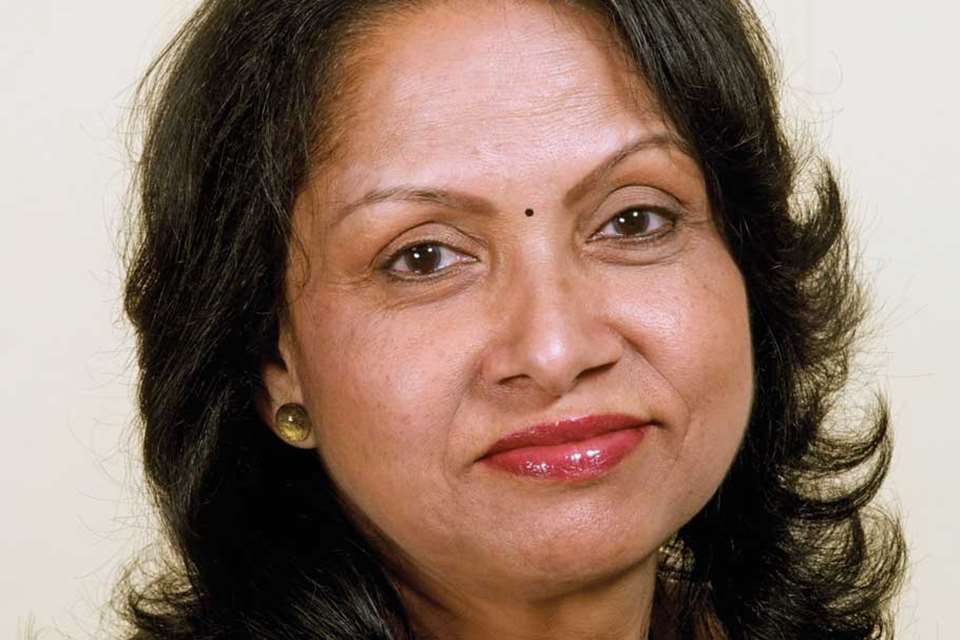EYFS Best Practice - All about…British values
Ruth Thomson
Monday, February 8, 2016
Experts and settings reveal how the values are being taught in theory and in practice. By Charlotte Goddard

Since September 2014, schools and early years settings in England have been required by Ofsted to show that they are actively promoting British values to the children in their settings. The move followed concerns about a perceived promotion of strict Islamist values in some schools in Birmingham.
But ‘British values’ as a concept can be misinterpreted. ‘It is important to knock down some of the myths that have been built up about British values, or as I prefer to call them, human values. The word ‘British’ has led to lots of companies making money selling things like Union Jack bunting and Morris dancing CDs, which is completely not what it is about,’ says Kathryn Solly, early years consultant and author, who delivers training on British values for Early Education.
‘You have to start with “what are values?”. They are there from pre-birth, and developing them is about families as much as settings and schools, about what we teach and how we model it as much as resources,’ says Ms Solly.
‘Unfortunately, there is a risk that some nurseries may interpret promoting British values as promoting images of Big Ben or the Queen, but it’s not about that at all,’ agrees Purnima Tanuku, chief executive of the National Day Nurseries Association. ‘It’s about tolerance, love for others, respect, sharing and caring – which nurseries are already doing as part of personal, social and emotional development.’ However, while some in the sector say nurseries are already covering what they need to, and just need to learn how to highlight this to visiting Ofsted inspectors or local authorities, Chrissy Meleady, chief executive of Early Years Equality and previously chair of the Sheffield Children’s Centre, stresses it is important that settings do not sit back and think that just because they are meeting the EYFS, they are also meeting their British Values requirements. ‘British values is also about providing a sense of belonging in Britain,’ she says.
The Government has defined British values as:
- democracy
- the rule of law
- individual liberty and mutual respect
- tolerance of those with different faiths and beliefs.
Settings are not allowed to:
- actively promote intolerance of other faiths, groups, cultures and races
- fail to challenge gender stereotypes
- routinely segregate girls and boys
- isolate children from their wider community
- fail to challenge behaviours that are not in line with the fundamental British values above.
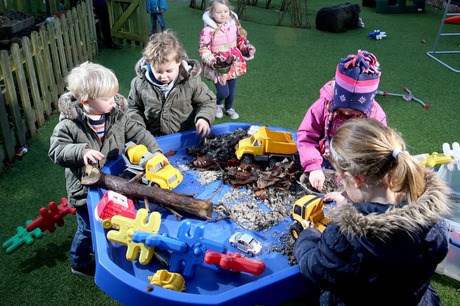
BRITISH VALUES AND THE EYFS
While Ofsted will be inspecting settings to ensure that they are meeting this duty, practitioners do not need to plan specific ‘lessons’ about British values. Ms Meleady says providers should embed their delivery of British values in the framework of the Early Years Foundation Stage.
‘Otherwise,’ she says, ‘they are in danger of delivering a box-ticking activity driven by fear of Ofsted, instead of by the desire to promote tolerance and democracy.’
The EYFS already promotes children learning right from wrong, mixing and sharing with other children, valuing each other’s views, knowing about similarities and differences between themselves and others and challenging negative stereotypes.
Ms Solly suggests a number of ways in which settings can show they are delivering these values. ‘So you might point out, for example, that settings are democracies, so the decisions are made together, children are taught about self-confidence, self-awareness, learning to take turns, share, collaborate, and understanding rules,’ she says.
‘The concept of “rule of law” is a bit heavy, but actually children are learning about right and wrong. For example, children can use the phrase “Stop it, I don’t like it”, or the Makaton sign of palm facing outward, with a reason “because you are hurting me”, and that is part of understanding rule of law.’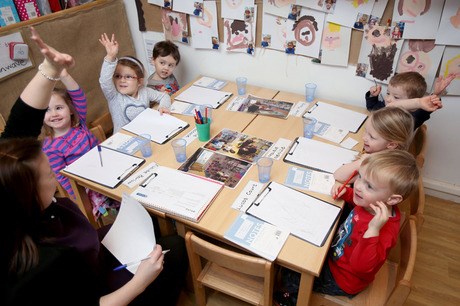
UPDATING POLICIES
Meeting the British values duty is about more than putting on activities and should go right down to the ethos of a nursery. ‘It is not just about activities but also policies, strategy and staff awareness, including managers and those at board and strategic level,’ says Ms Meleady. ‘It’s vital that settings review how they are delivering on equalities and human rights requirements, community cohesion, citizenship and prevention, considering their strengths and areas for improvement.’
Nurseries can add a statement on British values to their existing policies, which should be ‘live documents’ and updated to take new information into account. Little Blues Nursery School in Buckinghamshire, for example, has a policy statement explaining that ‘teaching the children British values is embedded in everything we do’. It includes details of how the specific values help the children’s personal, social and emotional development, and how the setting promotes this; for example, ‘We use timers to help the children take turns and share.’ (See below and http://little-blues-nursery-school-burnham.co.uk/our-policies.)
Early years consultant Mary Dickins says policies should be consulted on, involving parents and children as well as staff.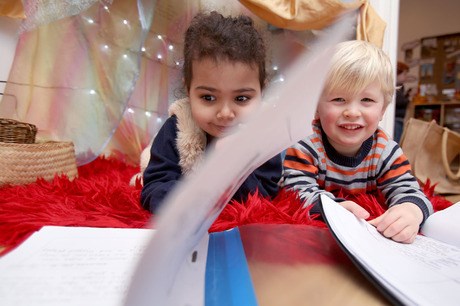
BRITISH VALUES AND CHILD DEVELOPMENT
The development of British values can be seen as something that it is necessary to impose on children for the benefit of society, but in fact these values can also be promoted in a way that benefits the developing child. Ms Solly suggests, for example, that to promote democracy, staff can support the decisions that children make and provide experiences that involve turn-taking, sharing and collaboration.
‘Children should be given opportunities to develop enquiring minds in an atmosphere where questions are valued,’ she says. ‘By encouraging children to express their views, it will teach children to value each other and talk about their feelings. Children need to be given these opportunities, as it will begin to develop their minds and help them understand about why decisions are made.’
Sheffield Children’s Centre has tried and tested a number of practical activities that are set out in the book British Values in Early Years Settings & Play Services (see box). Ms Meleady, the book’s author, says the activities are embedded in an Equalities and Human Rights framework as well as the EYFS. The activities aim to help children develop as a unique individual, become strong and independent and grow in awareness of matters of personal safety, as well as promoting inclusion, equalities, rights and British values. Some examples are:
Who am I?
This activity encourages children to talk about their names and how they came to be given them. Practitioners can look up meanings in a book of names or through other cultural sources, and create a chart of the children’s names. The children can then sit in a circle and say, ‘My name is… and your [child on the right] name is…’ This provides an opportunity to reflect on how children’s names are part of a diversity as well as being part of their own unique identity, linking to the values of individual liberty and of tolerance.
Fingerprints
Sheffield Children’s Centre links this activity to the British value ‘rule of law’, as well as helping children to identify their uniqueness. Children make thumbprints and examine them through a magnifying glass, exploring their similarities and differences. They use markers to create thumbprint animals. Nursery workers can then initiate a discussion around the fact that even though we are all people, or part of the same family, our prints are different and we probably drew different animals. The children’s centre extends this discussion into a reflection on the use of fingerprints by the police to support the rule of law.
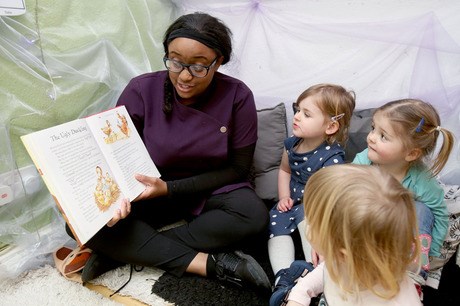
Using traditional tales
Sheffield Children’s Centre uses the Ugly Duckling as a means of stimulating discussion around prejudice and fairness, and the Little Red Hen to talk about justice. In the first instance, practitioners ask for words to describe how the duckling felt when he was young and rejected, and older and accepted, placing the words in drawings of a duckling and a swan. The discussion is then widened to talk about how it is against the law in Britain to discriminate against someone based on appearance.
Visiting places
Sheffield Children’s Centre organises visits to the local Town Hall during council meetings. Children have the opportunity to role-play in the council chamber, and staff encourage children to consider what they might do in a number of scenarios.
These activities and others are described in greater detail in British Values in Early Years Settings & Play Services.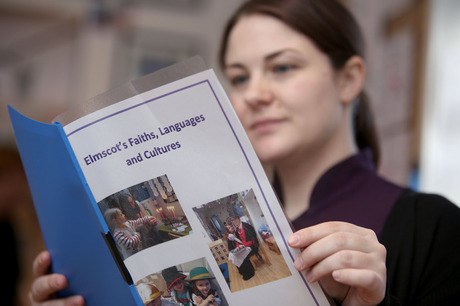
BRITISH VALUES AND INCLUSION
While British values, as defined by the Government and interpreted by the early years sector, work to promote inclusion, there are concerns that misunderstanding of the duty could promote mistrust. ‘Inclusion is not just about activities, it is about values – how families feel when they come to your setting,’ says Ms Dickins. ‘From my perspective, looking at inclusion, it’s about not making assumptions about children and encouraging children to think about differences positively – work which has been going on for a while in early years settings.’
She adds, ‘Early years settings have a strong role to play in building communities. If these values are promoted in the right way, they are good for community cohesion. We want to work positively, so let’s not let misunderstanding undermine it.’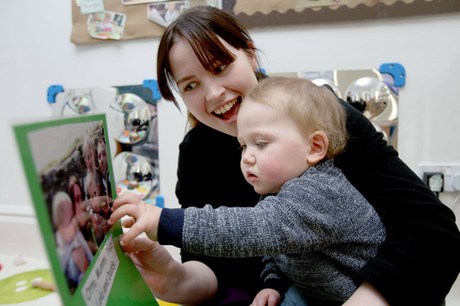
CASE STUDIES
ELMSCOT DAY NURSERIES
For the Elmscot nursery group, the main focus when it comes to promoting British values is highlighting to staff and parents how these values link in with what the settings already do. Managers at the group attended training in October last year, covering how the new language of the values links with everyday practice, and have cascaded their knowledge down to staff.
Weekly memos draw practitioners’ attention to examples of good practice, and displays in all of the rooms are designed to keep the terminology and the values front of mind for staff, as well as showing parents how they link to existing practice.
‘The “rule of law”, for example, links to our Golden Rules, which we have in the pre-school and are extending to the other rooms,’ says Jenna Holloway, deputy manager at Elmscot Day Nursery. ‘“Democracy” links to allowing children to make their own choices. For example, we have a “taste of the month”, where children choose what they want for lunch, and when we cover a topic, such as dinosaurs, we ask children what they want to do within that topic – paint a dinosaur, or find out more about what they eat.’
Democracy, in the form of listening to what children want, is extended to the youngest children and babies, through the Mosaic approach. ‘We track babies around the room, noticing if they don’t use one particular area, for example, and use that to reflect on how to deploy our resources,’ she explains. Every month children are asked what they want to do, and this is recorded in their folders.
The nursery plans to develop its garden space this year, and will be drawing on children’s views in the process. Democracy is also promoted through the pre-school committee or council. ‘Children give their very honest feedback about what they do and don’t like,’ says Ms Holloway. ‘They sit around a table, with a drink and a notepad so they can mark-make while talking.’
For the value of mutual respect and tolerance, the nursery has already created a booklet with information about the different celebrations, cultures and languages used by children across the settings. ‘Staff can turn to this and get information about a culture,’ says Ms Holloway. There are displays in different languages and in Braille, as one child is registered blind.
‘The value of individual liberty is promoted in the way we value the individual preferences of the children,’ explains Ms Holloway. ‘At circle time they are given choices about what they want to do, and they are able to bring in special things from home to show the other children.’
THE LITTLE BLUES NURSERY SCHOOL, BURNHAM, BUCKS
When ‘British values’ emerged as a hot topic at a local networking group, Little Blues Nursery School manager Emma Gordon decided to revisit the subject at a staff meeting and develop a policy statement.
‘We knew we were covering everything through the curriculum, but we wanted to gather the evidence to show how we were doing it,’ she says. ‘We also wanted to see what we were doing well and what we could improve on.
‘One of the outcomes, relating to democracy, has been a greater degree of consultation with the children. As well as asking the children’s views on the rules of behaviour within the 24-place nursery, staff have also [consulted the children on what they want to have more or less of within the setting]. We talked with the children about making choices, using visuals and voting for what they would like for snack, which story to have, when to go out to play and what activities they have enjoyed.’
Miss Gordon has found the exercise useful. ‘It has made us more aware of our shared values and more conscious of good practice and how important it is to respect each other. It’s also prompted us to be more proactive. The more aware we are of the issues, the more aware the children are, and we’ve seen that through their comments.’
FAIRFIELD DAY CENTRE, STOCKTON-ON-TEES
Practitioners at Fairfield Day Centre in Stockton-on-Tees used an elf to help promote British values. Each of the 35 children at the setting received a letter at the beginning of December saying that Chippie might come and visit. The children found Chippie in a different scenario every day, linked to each of the four British values statements, which were used to initiate discussions about topics such as respect, sharing and following rules.
Nursery manager Andrea Moore says, ‘We thought of using The Elf on the Shelf, like a lot of settings were doing over Christmas, but tying that into British values. Earlier in the year we made a small fairy garden, so the elf was a continuation of that. Discussions arising from Chippie’s actions included talking about older people and the fact not everyone has someone to look after them at Christmas, and about children in other countries.’
Staff created a display for parents about Chippie’s adventures, including children’s comments about what he had done and links to the British values statements, and pictures were also shared on Facebook, so children who attended part-time could find out what the elf had been up to. The setting intends to repeat the activity at Easter, with the Easter bunny visiting the nursery.
Ofsted inspectors praised the centre’s work and the setting turned around its Inadequate rating from June last year to achieve a Good rating in the most recent report, published this January.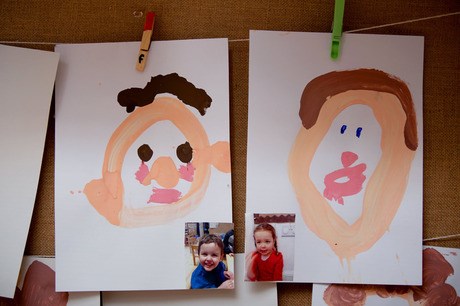
MORE INFORMATION
British Values In Early Years Settings & Play Services by Chrissy Meleady: contact cm.eyequality@btinternet.com for more information. To order a copy, contact equalitiesmatter@gmail.com
4Children has published good practice examples, www.foundationyears.org.uk/files/2015/03/Fundamental_British_Values.pdf
‘Teaching British Values in your Early Years setting’ is a factsheet produced by the NDNA, http://tinyurl.com/heg3j97
Common Inspection Framework, British Values and You is available from Pacey, https://www.pacey.org.uk/shop/books/professional-books/common-inspection-framework,-british-values-and-yo/



